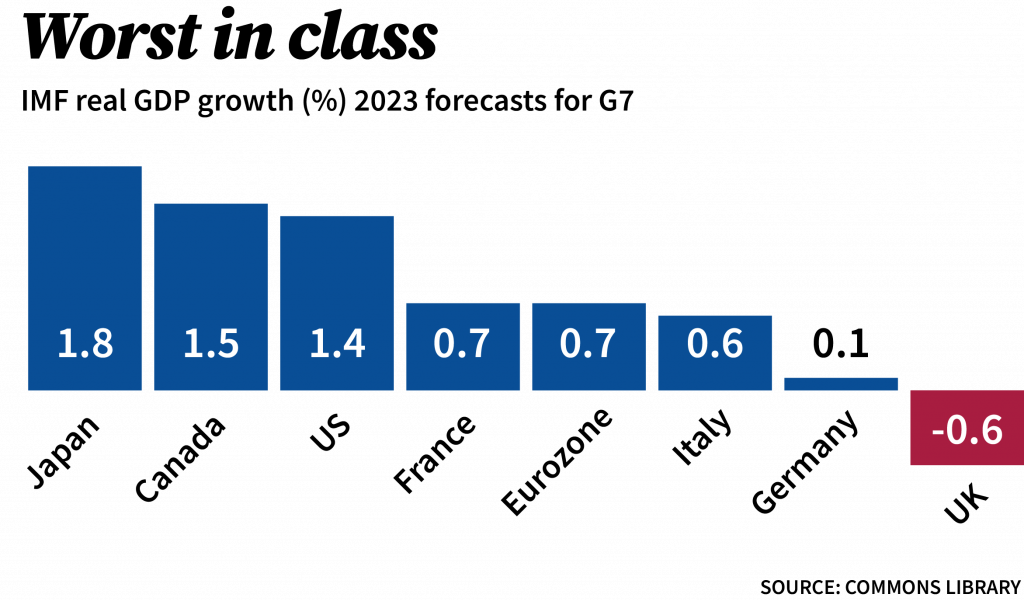According to IMF forecasts made in January, the UK economy will contract by 0.6% in 2023, while every other major economy will grow. It seems that austerity, Brexit and Covid weigh heavily on our prospects.
But these are the straws that broke the camel’s back. The British economy could and should have survived all these shocks, but it has been fatally handicapped by two major problems.
First, its rate of productivity and growth have been terrible for years. That meant there wasn’t enough growth to finance spare capacity in the NHS or social care, nor enough spending on emergency planning, and people lacked savings to cushion the blows, as wages and living standards had been squeezed for years.
Secondly, successive governments have been trapped by an economic orthodoxy that, while electorally successful, has not gone according to plan. Their idea has been that growth is created by lowering taxes and cutting financial regulation, and that the government can continually afford to keep bribing voters with tax cuts to win their votes.
The financial crisis of 2008 was a severe blow to the economies of the western world. Banking systems had to be bailed out and quantitative easing was necessary as central banks threw hundreds of billions at their economies to keep them moving. Investment was damaged, bank lending stalled and entire economies were mired in an economic morass.
But it was far worse for the UK, because our government imposed austerity on an already weakened economy. Just when the economy needed more training, more investment, a faster move to greener, more efficient technologies, more research, better services, better infrastructure, a quicker legal system, and good healthcare, it got the exact opposite.
The UK saw a prolonged period of spending cuts by central and local government. Demand dried up but so did productivity, which – contrary to Tory party thinking – depends to a large degree on government support to keep growing. Austerity kills growth and productivity.
Between 2012 and 2021 productivity in the UK grew by just 24%, while in Germany it grew by 33% and in France by 34%. Or to put it another way, between 1974 and 2008, the UK’s productivity grew at an average rate of 2.3% a year, but between 2008 and 2020 it grew at only 0.5%. The last time productivity growth was so bad for so long was before the industrial revolution.
The UK fell even further behind, and with low productivity came low growth and low pay. The 2010s saw the slowest overall growth rate for the economy since the 1950s, despite there being no recession. The average annual growth rates were very bad and most growth came from a rising population, not a dynamic economy.
If the UK had kept up with its rivals, the average family would now be earning another £9,000 a year. Instead, wage growth between 2010 and 2020 has been the lowest of any peacetime decade since the Napoleonic wars. If wages and wealth had increased at a similar rate to past decades, HM Treasury would be pulling in billions of pounds more tax than they are. In fact, the taxes lost to low growth are far larger than the costs of Brexit and Covid combined, each and every year.
But while the tax take is far smaller than it should be, the hard right continues with its campaign to persuade people they can have first-rate public services and tax cuts. The fact that even this Tory government is having to increase the percentage of money it takes from the economy in taxation and still cannot afford to fix the gaping holes in the NHS, schools, defence or anything else, shows how ridiculous this argument is.
It goes back to Thatcher and the Tory mantra that people should always pay less tax. Strangely, what few realise is that taxation as a percentage of GDP rose under Mrs Thatcher. She increased income tax when she came to power, doubled VAT and then let the North Sea oil revenues flood in. The money was used to cut headline tax rates, mainly for the wealthy, and to fund dreadful levels of unemployment.
Remember how the UK was grey, dirty and falling to pieces by the end of John Major’s premiership? Well, it is again now. The explanation is the same in both cases – the government has not got enough money coming in to fund a well-functioning state, yet still boasts that it can afford to cut taxes. The “intellectual” justification for this policy is that low taxes create growth, which boosts government revenue. There is no evidence to suggest this is true.
The idea that a better-funded state helps to drive economic growth is rejected with arguments about feckless claimants, civil service waste, overpaid mandarins and the need to cut “fat” from the system. The claim that they have been cutting “fat” for a decade and there is still apparently much more to get rid of seems increasingly unacceptable, not least because we can all see that multiple government departments are failing to meet even minimum standards of performance or service. The simple fact is – you get what you pay for.
The NHS is not suffering because of useless middle managers, highly paid nurses or lazy consultants. The recent account given in these pages by an NHS doctor of her working life makes that very clear. The issue is that the UK spends at least 2% less of its GDP on health than other similar countries. The same can be said for many other parts of the state – they are just underfunded. Germany raises 37.5% of GDP in taxation every year, the UK 33.3%. Think what you could achieve with 4% of GDP for services, infrastructure, research, education and training every year for decades.
The ideological problem has been that, for decades, the UK has tried to run a European-style government with US-level tax rates. It got away with it for years but now the game is up. Growth has stalled and the state is in a profoundly weakened position. Its answer, once again, will be to cut. And worse than that, from the Tory perspective at least, is that taxes are going to have to rise for years, borrowing will remain high and another round of painful cuts to spending is on the way. If this were to happen, the NHS and social care will continue to suffer; pay rises for nurses – or teachers – won’t be forthcoming
Which raises the question: why? How could an economic policy of this sort be so persistent? The answer lies in the half-remembered Thatcherism which dominates the thinking of the free-market end of the Tory back benches. For this group, there is no link between government activity and healthy economic growth, so why bother funding the state? That view is remarkably stubborn, and influential – it seems the prime minister is sympathetic to it.

To this ideological drag can be added the effect of Brexit, which has made the UK’s economy at least 5.5% smaller than it would have been if we had stayed in the EU. That is costing at least £40bn a year in lost tax revenues.
And let’s not forget Covid. Boris Johnson argued that the vaccine rollout was a triumph, and that it saved the nation from a much worse fate. Even if that were true, a cold look at the figures shows that the UK is the only G7 country not to have recovered economically from the pandemic. In fact, the UK is now a smaller economy than it was pre-Covid, the only major western economy in that position. The failure to recover has cost the UK economy around 2% of growth or about £15bn more a year in lost taxes.
As well as this, many Covid loans to business remain unpaid, it is fairly clear that the government spent £15bn on protective medical equipment that turned out to be unusable, and that a further £37bn was spent on the track and trace programme.
We emerge from that crisis to find the war in Ukraine has created an inflationary boom and pushed Britain into recession. There is no doubt that Putin’s war is having terrible global economic consequences. And yet, the UK is destined to have the worst recession out of all the major economies, including Russia, the subject of international sanctions.
As for the brief tenure of Liz Truss, her economic prospectus nearly destroyed the pensions sector, created a run on the pound, put up the cost of borrowing and has had to be reversed and paid for with higher taxes than at any time since the 1940s. The estimated cost to Britain of her infamous “mini-budget” is now reckoned to be at least £40bn. Truss has recently tried to rehabilitate her reputation by staging a “comeback”.
It is not certain that Britain could survive another brush with the economic policies that Truss promotes so enthusiastically, and in the face of such overwhelming evidence that they don’t work. But then this government seems particularly drawn to destructive economic ideas. Like the madman, they repeat the same act, over and over, hoping for a different result. And we are stuck with the consequences.




